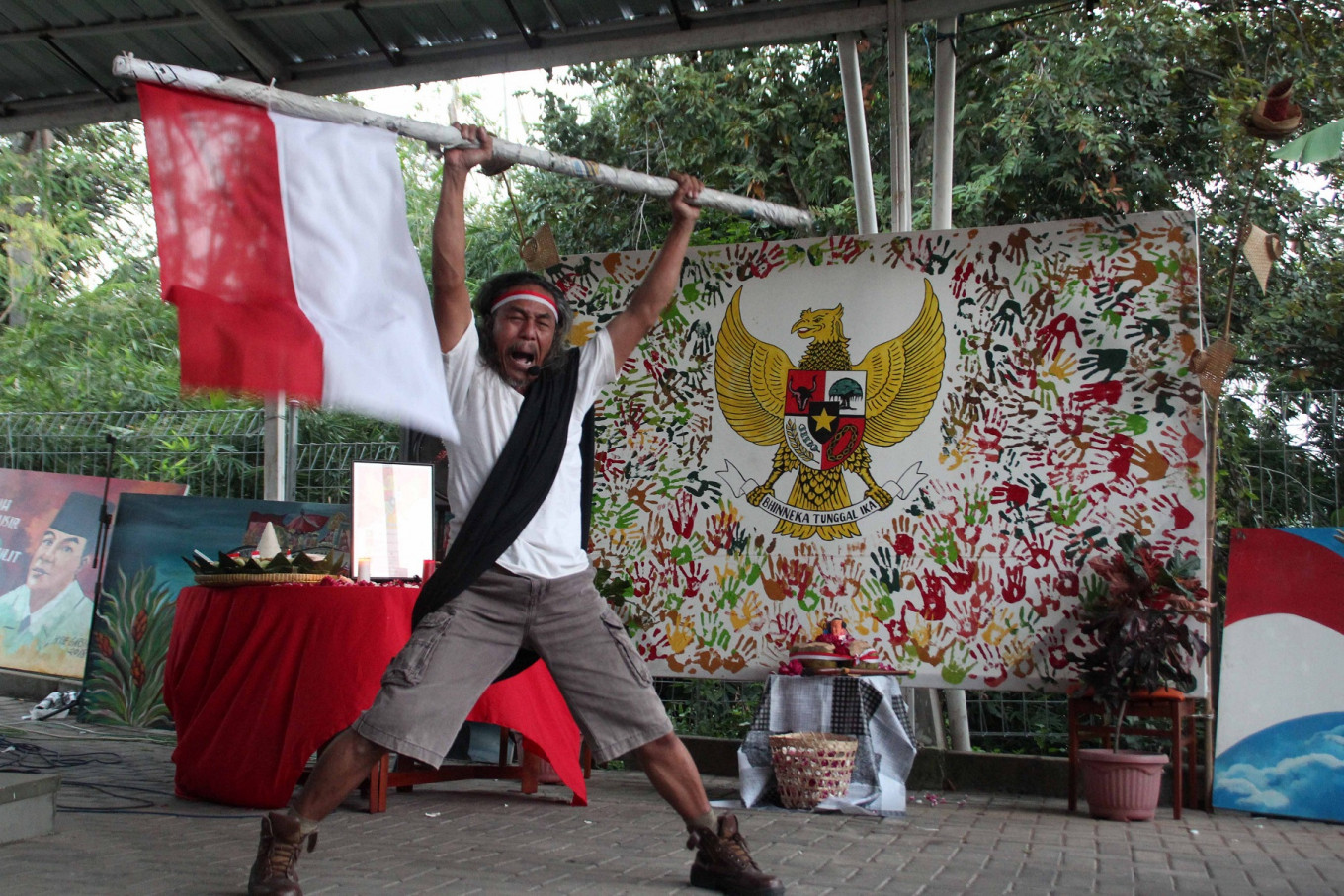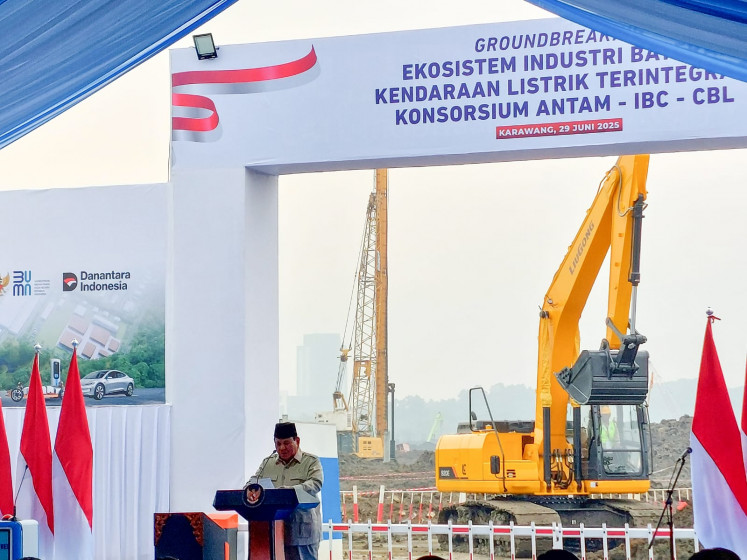Popular Reads
Top Results
Can't find what you're looking for?
View all search resultsPopular Reads
Top Results
Can't find what you're looking for?
View all search resultsPancasila under threat of politicization
BPIP dismisses concerns that state ideology is being weaponized by govt
Change text size
Gift Premium Articles
to Anyone

T
he highly contentious dismissal of 51 Corruption Eradication Commission (KPK) employees for failing a civics test aimed at assessing their understanding and loyalty to the national ideology of Pancasila raises the specter of the New Order regime that once weaponized it to quash dissenters and achieve short-term political goals.
The civic test was marred by irregularities and is seen by critics as nothing but a ploy by the political elites to remove senior investigators within the commission, including Novel Baswedan and Harun Al-Rasyid, who have led major corruption cases implicating high-profile politicians. The test was preceded by a systematic social media campaign describing Novel and other elements within the KPK as “Taliban”, or Muslim radicals who are opposed to Pancasila. The narrative, decried as baseless by KPK employees and antigraft activists, is now being used to legitimize the results of the controversial civic tests on social media, even though those failing the tests include non-Muslims.
The controversy surrounding the KPK civic test has come on the heels of the disbandment of Islamist groups—Hizbut Tahrir Indonesia and the Islam Defenders Front (FPI)—on the grounds that their ideologies contravene Pancasila, among other factors, a policy critics describe as “illiberal” and setting a bad precedent for the trajectory of Indonesian democracy.
New order specter
The series of events has fueled concerns about the potential weaponization of Pancasila, especially after President Joko “Jokowi” Widodo’s administration established the Agency for Pancasila Ideology Education (BPIP) in February 2018. The agency, now led by Indonesian Democratic Party of Struggle (PDI-P) leader Megawati Soekarnoputri, has been granted a sweeping mandate to promote and safeguard Pancasila values.
Monash University emeritus professor Ariel Heryanto said the sweeping use of Pancasila to discredit and delegitimize elements of opposition was “a cause for concern”, adding that it was reminiscent of the style of governance during the New Order regime.
In 1979, then-president Soeharto set up the Supervisory Body for the Implementation of the Guide to Realization and Implementation of Pancasila (BP7), which was tasked with indoctrinating citizens in the five founding principles of Pancasila. The Soeharto government also instituted a compulsory Pancasila course, known as P4, to be taught in educational institutions.
Ariel said there was a tendency among members of the political elites, particularly since the New Order era, to use Pancasila as a tool to eliminate political enemies. Such a tendency, he added, continued to this day with the political elites holding on to the notion that the people should be thoroughly educated about Pancasila.
“Members of the general population are assumed to not be adequately acquainted with Pancasila, or prepared to accept it, and thus must be trained so that they will be more ‘Pancasila-ist’,” Ariel said. “This is done either with good intentions or […] with pragmatic intent to discredit, stigmatize and delegitimize political enemies.”
Problematic policies
In December last year, the government banned the FPI, which had emerged as a symbol of political resistance to the Jokowi administration by more conservative elements in Indonesian society, on several grounds: it violated the 2017 Mass Organization Law for having a statute that contravenes Pancasila and the 1945 Constitution, it failed to renew its registration with the Law and Human Rights Ministry, engaged in vigilantism and dozens of its members had been implicated in terrorist activities.
The 2017 Law, which amended the 2013 version of the regulation, stipulates that mass organizations’ statutes should not contravene Pancasila or the 1945 Constitution, while it also forbids any mass organizations from subscribing to or disseminating teachings that contravene Pancasila.
The legislation is considered problematic as it grants the government the power to disband mass groups without due process. Such power was first invoked by the government disbanding the HTI in 2017 amid rising sectarian sentiment in the country during the course of the Jakarta gubernatorial election, which pitted then-incumbent Basuki Tjahaja “Ahok” Purnama, a Jokowi ally, against former culture and education minister Anies Baswedan.
The government established the BPIP soon after disbanding the HTI, with Megawati, daughter of Sukarno, a cofounder of Pancasila, tapped to lead the agency’s steering committee. Her role was later expanded to also include leadership in the National Research Agency (BRIN) after its chairman Laksana Tri Handoko confirmed earlier this month that BRIN’s steering committee would be led by the leader of the BPIP’s steering committee.
Head of the Indonesian Institute of Sciences’ (LIPI) Political Research Center, Firman Noor, said Megawati’s BPIP position had raised concerns over the politicization of Pancasila, which he said was more evident following confirmation that Megawati would also lead BRIN’s steering committee. “There are concerns that [the BPIP] will assume a role that was played by similar institutions in the past, namely to provide a certain interpretation [of Pancasila] that is not free from political interest,” said Firman on Thursday.
No single narrative
The BPIP has dismissed such concerns. BPIP expert staff member Antonius Benny Susetyo said the concerns over the return of the New Order-era Pancasila indoctrination efforts were “excessive”, adding that the BPIP did not have the authority to provide a one-sided interpretation of Pancasila to the public.
“The BPIP does not have powers to provide a single narrative [on Pancasila]. That is impossible because the function and authority of the BPIP is only to disseminate the values of Pancasila,” Benny said on Wednesday.
He also dismissed concerns that Megawati’s position in the agency’s steering committee would bring the BPIP under her party’s political influence, saying that Megawati had never intervened in the deliberations of the agency’s executive board and added that the decisions of the agency were reached through consensus.
Airlangga University lecturer Airlangga Pribadi Kusman stressed the importance of a holistic understanding about Pancasila in order to break through the polarization narrative in the current discourse about Pancasila.
As a state ideology, Pancasila was founded upon five principles, namely belief in God, humanity, unity, democracy and social justice. “What’s important [in the current discourse of Pancasila] is how Pancasila can be translated into a framework of concrete values [for the public],” he said.
Airlangga said that discussions on the government’s anticorruption agenda could be framed around Pancasila’s fifth principle, namely social justice, or that suppressing criticism would be in contravention of Pancasila’s fourth principle, namely democracy. Such framing was essential to bring Pancasila back to Sukarno’s vision of it as the “basic foundation” of the country, Airlangga added.









